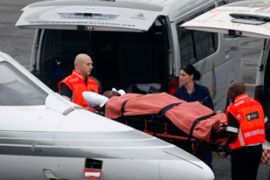Togo ‘will play’ in Angola cup
Confusion as players say the team will defy a government call to head home after shooting.

A Togolese government minister said on Saturday that the team would return home because of the “dramatic situation” in Angola’s Cabinda province, where a low-level separatist conflict has been ongoing for three decades.
Players ‘heartbroken’
But Romao was quoted as saying: “People died for this tournament, others were injured. We can’t abandon them and leave like cowards.
“If we stay here, it’s for them. But also so as not to give satisfaction to the rebels.”
| in depth | |||
|
Thomas Dossevi, a Togolese striker who plays for the French side Nantes, echoed Ramo’s remarks saying that the team would line up against Ghana for their first game of the tournament “in memory of the dead”.
“We are all heartbroken, it is no longer a party, but we want to show our national colours, our values and that we are men,” he said.
Al Jazeera’s Andy Richardson, reporting from Luanda, said: “The Togo team are tremendously proud of playing for their country.
“This is the premier tournament for football players on this continent, so if Togo do decide to stay it would not be a huge surprise.”
The Africa Nations Cup is due to start in the capital Luanda with game between the hosts and Mali on Sunday.
The Confederation of African Football (CAF), tournament organisers, said in a statement on Saturday that matches in Cabinda would go ahead as scheduled.
‘Weapons will talk’
A group fighting for the independence of the oil-rich region, which is divided from the rest of Angola by Democratic Republic of Congo, claimed responsibility for the attack on Friday, saying it was aimed at the team’s military escorts.
| FROM THE BLOGS | |||
|
On Sunday, Rodrigues Mingas, the secretary-general of The Forces for the Liberation of the State of Cabinda-Military Position (Flec-PM) said that there would be further attacks if matches were staged in Cabinda.
“This is going to continue, because the nation is at war, because Hayatou persists,” Mingas said referring to Issa Hayatou, the head of the African football federation.
“Weapons will continue to talk,” he said.
But Samuel Petrequin, a sports writer for The Associated Press news agency, told Al Jazeera that the streets of Cabinda were “peaceful” in the wake of the attack.
“It seems the games will go ahead as planned,” he told Al Jazeera.
“There is no violence at all, maybe they can have the games as it was planned. The Angolan government said after the attack that it was going to increase security measures.”
‘Security tight’
Al Jazeera’s Mourad Labarab, reporting from Cabinda, said that security measures had become “very tight” since the attack.
“The army have been deployed throughout the city and also we have seen checkpoints … movement in the city has become very difficult and just getting close to the stadiums could take hours.
Togo were scheduled to play Ghana in Cabinda on Monday in the first of seven matches in the region.
The team bus came under attack shortly after crossing into Cabinda on Friday, despite reportedly being escorted by two police vans.
The Angolan bus driver was killed instantly. The team’s assistant coach and spokesman later died of their wounds.
Kodjovi Obilale, the reserve goalkeeper, was evacuated to Johannesburg where he underwent surgery.
“He is conscious and in a stable condition. He is fully receptive he understands where he is,” Richard Friedland, the doctor treating Obilale, told local radio.
“We will still be taking him to theatre, he has obviously suffered some internal injuries.”

